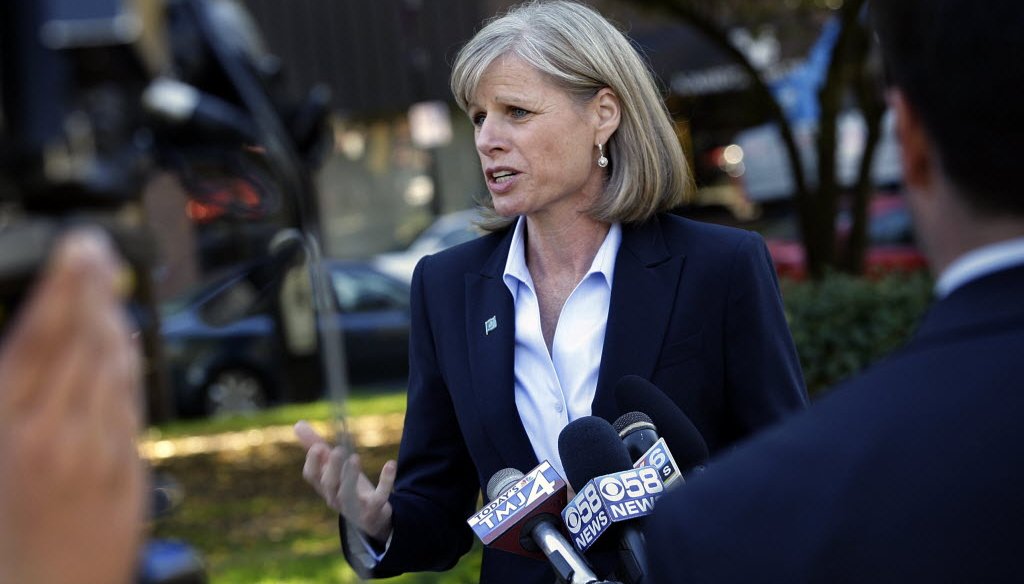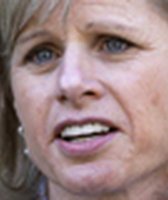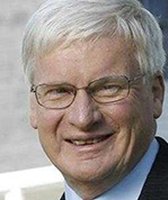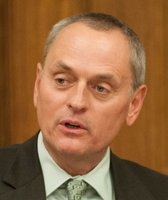Get PolitiFact in your inbox.

Gubernatorial candidate Mary Burke holds a press conference at Cathedral Square Park in Milwaukee on Tuesday, Oct. 8, 2013. MJS photo Angela Peterson
Mary Burke says Wisconsin second to last in business formation
In her first extended TV interview, gubernatorial hopeful Mary Burke downplayed the notion that Wisconsin’s tax climate is a roadblock to job growth that has lagged behind the national average.
"We have to make sure we’re competitive with other states, but I’m not sure that’s a major factor," the Madison Democrat said Oct. 13, 2013 on WISN-TV’s Upfront with Mike Gousha show. "Companies look at qualified work force, being able to attract people to Wisconsin, the quality of life, the schools."
One key to job growth, the former Trek Bicycle executive said, is to boost Wisconsin’s track record of developing new businesses.
"Entrepreneurship is incredibly important to growing economies, and we’re 49th in the United States in new businesses created," Burke said. "So we have to make sure we’re supporting people starting their businesses, growing them and having the capital to do that."
Is Wisconsin that close to scraping the bottom on business startups?
It’s a particularly interesting question since Republican Gov. Scott Walker is emphasizing that more than 11,000 new business entities have formed since he took office in January 2011.
That increase in net new formations, a 3 percent rise, is a positive economic sign but doesn’t say much about startups and new job creation because many of the new businesses are limited partnerships set up for legal or liability reasons and don’t employ anyone. That’s what we found in our recent Walk-O-Meter evaluation of Walker’s promise to create 10,000 new jobs.
Digging into Burke’s numbers
To back up her claim, Burke campaign spokesman Joe Zepecki pointed us to a study conducted annually by the nonpartisan Kauffman Foundation.
The foundation’s study, which is widely cited and known as the Kauffman Index of Entrepreneurial Activity, uses U.S. Census data to capture the number of new business owners in their first month of significant business activity.
The 2013 study, based on 2012 data, found that Wisconsin had the third-lowest number of entrepreneurs per 100,000 people. It was ahead of only Nebraska and Minnesota, equivalent to a ranking of 48th.
So Burke was very close to the mark based on the study.
And Wisconsin’s recent history shows a similar performance -- rankings of 40, 49, 28 and 48 in the Kauffman Index from 2011 to 2008. Notably, back in 2000, only two states had better numbers than Wisconsin.
"Entrepreneurial activity rates follow strong geographical patterns," the 2013 study said. "Entrepreneurial activity generally is highest in Western and Southern states and lowest in Midwestern and Northeastern states."
We should note that the Kauffman Foundation warns that its study isn’t meant to provide a precise ranking of states. But its report in effect does that by reporting precise ratings and singling out states in the top five highest and lowest groups.
To expand the picture, we spoke to Kauffman spokeswoman Barb Pruitt and two academic experts with deep experience in researching the rate of business startups.
All agreed that the Kauffman index is just one way to measure entrepreneurship, and has some significant limitations. For instance, it counts a lot of part-time self-employed people who by definition don’t employ anyone else.
Kauffman, it turns out, funds the U.S. Census Bureau program that produces a separate set of statistics that tally openings and closings at businesses with paid employees. The data is collected from business-registry statistics and employer payrolls.
This data sheds more light on entrepreneurial activity, we were told by two leading researchers in this area, Scott Shane, professor of entrepreneurial studies and economics at Case Western Reserve University, and Zoltan Acs, director of the Center for Entrepreneurship and Public Policy at George Mason University.
Ian Hathaway, an economic advisor to Engine, a research and policy group for technology startups, analyzed 2011 data on openings and closings. He pointed us to a number that illustrates new business formation rate in each state.
The results were identical to the Kauffman index report: Wisconsin was ahead of only two states. The same was true in 2010.
An important note: Because of a time lag in Census reporting, the March 2011 snapshot is the latest available. That only covers a few months of Walker’s term.
We asked Tom Still, president of the Wisconsin Technology Council, about Wisconsin’s track record on startups.
"It’s an imperfect science but most indicators would confirm that Wisconsin ranks among the bottom 10 states for net company creation," Still said. "That may be explained, in part, because the recession started later in Wisconsin and ended later here, as well."
Still said he’s optimistic the climate here is changing, but he added that future economic trends and public policy decisions on helping foster growth in startup-firms will play a big role.
Finally, we found that Wisconsin looks better on a third measure: U.S. Bureau of Labor Statistics figures on the net number of "business establishments" in each state. In 2011, Wisconsin ranked 19th on its percentage increase over the year before, according to research by Economic Modeling Specialists Intl., a private firm that tracks labor-market trends.
But EMSI and other experts say the BLS figures don’t reflect just new businesses; establishments can refer to new outlets or locations that existing businesses open up, for instance.
Our rating
In a discussion of how she would be different than Walker, Burke’s claim was that Wisconsin is "49th in the United States in new businesses created."
Both the study she cited, as well as data seen as a better indicator of startup activity, put Wisconsin at 48th, not 49th. The data is somewhat dated, covering only part of Walker’s time, but is the latest available.
With those clarifications, we rate her claim Mostly True.
To comment on this item, go to the Journal Sentinel's web page.
Our Sources
WISN-TV, "Upfront with Mike Gousha," video of Mary Burke appearance, aired on Oct. 13, 2013
"Kauffman Index of Entrepreneurial Activity, 1996-2012," by Robert W. Fairlie, April 2013
Email interview with Joshua Wright, public relations manager and senior editor, Economic Modeling Specialists Intl., Oct. 14, 2013
Interview with Tom Still, president, Wisconsin Technology Council, Oct. 16, 2013
Interview with Scott Shane, professor of entrepreneurial studies and economics at Case Western Reserve University, Oct. 15, 2013
Interview with Zoltan Acs, director of the Center for Entrepreneurship and Public Policy at George Mason University, Oct. 15, 2013
Email interview with Joe Zepecki, spokesperson, Burke campaign, Oct. 15, 2013
Interview with Barbara Pruitt, director in communications for the Ewing Marion Kauffman Foundation, Oct. 15, 2013
Kauffman Foundation Research Series: Firm Formation and Economic Growth, "The Return of Business Creation," July 2013
Browse the Truth-O-Meter
More by Dave Umhoefer
Mary Burke says Wisconsin second to last in business formation
Support independent fact-checking.
Become a member!
In a world of wild talk and fake news, help us stand up for the facts.





















































